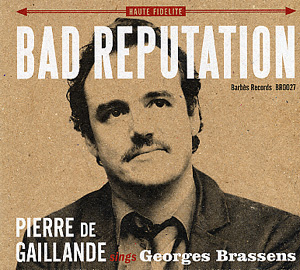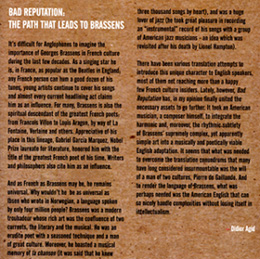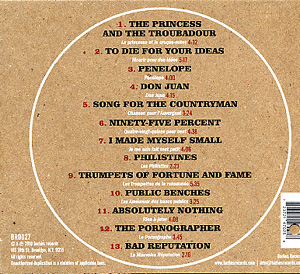


retour page guide
Bad Reputation
Pierre de Gaillande
Juin 2010 : le CD



La note de Didier Agid : Bad reputation The path that leads to Brassens
En Français : Bad
Reputation, le chemin qui mène à Brassens
Il est difficile aux anglophones d'imaginer l'importance de Georges Brassens dans la culture française depuis quelques dizaines d'années. En tant que vedette de la chanson, il est, en France, aussi populaire que les Beatles en Angleterre : n'importe quel Français peut vous chantonner une bonne douzaine de ses chansons, de jeunes artistes ne cessent de l'interpréter et presque toutes les têtes d'affiches actuelles se disent avoir été influencées par lui. Pour beaucoup, il est aussi le descendant spirituel des plus grand poètes de la langue : de François Villon à Louis Aragon, en passant par La Fontaine, Verlaine et d'autres. Conscient de son appartenance à cette lignée, Gabriel Garcia Marquez, le Prix Nobel de littérature, lui a décerné le titre de plus grand poète français de son temps. Des écrivains, des philosophes se réclament aussi de son influence.
Et
Brassens si français qu'il soit, est universel. Pourquoi Brassens ne serait-il
pas autant universel qu'Ibsen qui écrivait en norvégien, langue alors parlée
par seulement quatre millions de personnes ? Brassens fut un troubadour moderne
dont l'art, très riche, est la rencontre de plusieurs courants. Courants littéraires
: un poète érudit à la technique très travaillée, un homme de grande
culture. Courants musicaux : une mémoire musicale de la chanson (il en
connaissait, dit-on, 3000 par cœur), un grand amateur de jazz (son grand
plaisir fut d'enregistrer un disque "instrumental" de ses chansons
avec quelques jazzmen américains, idée qui sera reprise après sa mort par
Lionel Hampton).
Il y eut quelques tentatives d'adaptation cherchant à faire connaître cet étrange personnage aux anglophones qui ne dépassèrent guère quelques cercles d'initiés à la culture française. Bad Reputation a, pour moi, enfin réuni les bons atouts. Il fallait un musicien américain, compositeur lui-même pour intégrer la subtilité harmonique et surtout rythmique d'une musique très complexe et, art suprême, d'apparence si simple. Il fallait, pour surmonter des difficultés de traduction que certains disent insurmontables la volonté d'un homme de deux cultures, Pierre de Gaillande. Et, pour rendre la langue de Brassens, peut-être fallait-il la langue anglaise d'Amérique qui sait si bien manier le complexe sans jamais se perdre dans l'intellectualisme.
| 01
The princess and the troubadour
02 To die for your ideas |
08 Philistines |
Plus, sur pierredegaillande.com
et commande possible du CD sur Amazon.fr ICI